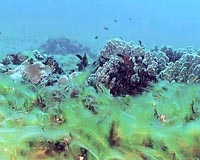| . |  |
. |
Rio De Janeiro (UPI) Feb 3, 2009 Brazil is beefing up security patrols in its waters to protect its fishing zones in a $17 million boost that includes the addition of more vessels and new electronic monitoring equipment. The security operation aimed at the fishing zones comes after Brazil announced plans for huge investments to build up its naval presence around the newly discovered sub-sea oil and gas deposits. The patrols now involve a total of 27 vessels after an additional four were bought and put into service last year, officials said. Minister of Fisheries Altemir Gregolin said the security operations would be extended to patrol the waters of the states of Santa Catarina, Rio Grande del Sur, Ceara and Para. He said expansion of the security fleet would continue and would entail the addition of another 23 vessels, nine of which are under construction. Another 15 will be purchased, he said, but gave no immediate details. Fisheries and aquacultures are a major earner for Brazil, and the sector's share of gross domestic product in 2009 exceeded $2.6 billion. The fisheries and aquaculture industries provide about 3.6 million jobs, and there have been suggestions that Brazil needs to beef up security to protect its fisheries and facilitate their legitimate expansion by eliminating illegal activities that deprive the government of tax and other revenue. The government has also tightened legislation as part of a program of development of the industry's export potential. As the first step, the government last year upgraded the special secretariat of aquaculture and fisheries to a ministry, which put Gregolin in charge of the strategic development planning for the sector. Critics have warned the government against over-exploitation of the country's marine resources and depleting stocks that may not be easily renewable. However, the government has already put in place a plan that will see the fisheries' yield increase from 1 million tons to 20 million tons annually. Part of the strategic plan is an overall revamping of the security infrastructures to protect the industry from criminal gangs and also to contribute more toward poverty reduction among the workforce, most of which is made up of a rural population with minimal access to modern amenities. Officials said that expansion of refrigeration, communications and other commercial networks would create more jobs and help improve economic conditions for the coastal communities that depend on aquaculture and fisheries for their livelihood. "We must monitor the situation closely; we can't be careless. Should that happen, our natural resources would simply be exhausted," Gregolin said in an interview with Revista Portos e Navios. He said improved patrolling had produced results in the past and would do so again when wider measures are in place. He cited the example of the sardine yield in the 1970s that dropped dramatically from 220,000 tons to 17,000 tons but began to recover after improved patrolling. In 2003 the Fisheries Secretariat, the Environment Ministry and the Brazilian Environment and Renewable Natural Resources Institute joined forces to improve monitoring. One of the measures undertaken was an extended ban on sardine fishing to allow the stock to recover. Sardine yields in Brazil improved as a result and totaled 100,000 tons in 2009, MercoPress reported.
Share This Article With Planet Earth
Related Links Water News - Science, Technology and Politics
 Is Iron The Culprit In Algae Blooms
Is Iron The Culprit In Algae BloomsBrisbane, Australia (SPX) Feb 04, 2010 A QUT team of scientists is taking an in-depth look at how iron, which gives our iron-rich soil its red colour, reaches water to potentially contribute to the algal blooms, which not only have a foul smell, but also make our eyes sting, cause fish kills and smother seagrass. Their research is centred on the catchment of Poona Creek on the Fraser Coast which drains into Great Sandy Strait - ... read more |
|
| The content herein, unless otherwise known to be public domain, are Copyright 1995-2010 - SpaceDaily. AFP and UPI Wire Stories are copyright Agence France-Presse and United Press International. ESA Portal Reports are copyright European Space Agency. All NASA sourced material is public domain. Additional copyrights may apply in whole or part to other bona fide parties. Advertising does not imply endorsement,agreement or approval of any opinions, statements or information provided by SpaceDaily on any Web page published or hosted by SpaceDaily. Privacy Statement |